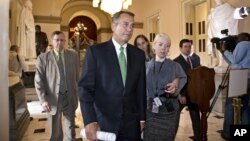WHITE HOUSE —
U.S. President Barack Obama and the Republican Speaker of the House of Representatives, John Boehner conferred by telephone late Tuesday. The conversation came as the White House and congressional Republicans exchanged new offers and counter-offers in fiscal negotiations.
White House officials confirmed the conversation after details emerged of a new administration offer to try to move negotiations forward.
A White House aide said the offer went to Capitol Hill on Monday, a day after the president and Boehner had their first face-to-face talks in a month.
House Republicans responded with a counteroffer, leading to the conversation Obama and Boehner had Tuesday evening.
The latest exchanges came amid increasing urgency for a deficit reduction deal to avert $600 billion of expiring tax cuts, and government spending cuts mandated by a deficit and tax deal in 2011.
Tuesday began with Boehner's remarks on Capitol Hill accusing President Obama of dragging out the negotiations.
“A lot of people know that the president and I met on Sunday. It was a nice meeting. It was cordial. But we are still waiting for the White House to identify what spending cuts the president is willing to make, as part of the ‘balanced approach’ that he promised the American people," he said.
But at Tuesday's White House news briefing, press secretary Jay Carney asserted it was Obama who has made specific proposals for budget reductions, not the Republicans.
“The president, unlike any other party to these negotiations, has put forward detailed spending cuts, as well as detailed revenue proposals," he said.
Congressional aides said the latest White House offer involved $1.4 trillion in new revenue. That is a $200-billion decrease from the figure President Obama put on the negotiating table a month ago.
Republicans had earlier countered with an $800-billion offer. Boehner has been insisting that higher taxes President Obama wants wealthy Americans to pay for deficit reduction would stifle job creation and slow economic growth.
In an interview with Barbara Walters of ABC News, Obama said he is "pretty confident" that Republicans will agree on a plan that will extend tax cuts for middle class Americans, saying the "framework" of a potential deal is "pretty straightforward."
Another difficult issue in the negotiations involves the struggle over raising the U.S. debt ceiling, the amount of money the government is legally allowed to borrow.
With another debt ceiling increase required early next year, President Obama insists he will not allow a repeat of last year's struggle over the issue which led to a first-ever downgrading of the U.S. credit rating.
It remains to be seen whether Tuesday's developments will lead to more substantial movement in the talks.
A Boehner aide said Republicans are still waiting for Obama to identify specific spending cuts the administration is prepared to make, and repeated the assertion that the president is "slow-walking" the negotiating process.
